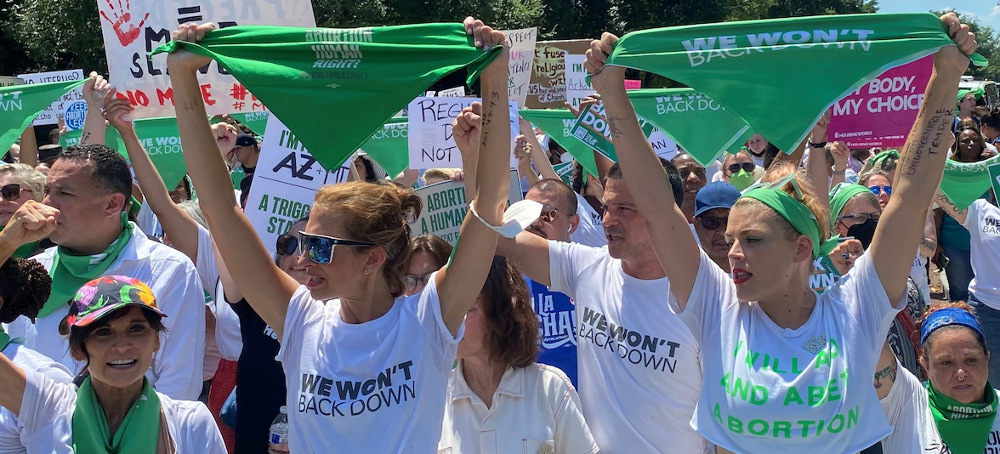These Three States Show How Far Republicans Will Go on Abortion Bans Post-Roe
Rachel Roubein and McKenzie Beard The Washington Post Abortion rights advocates protest in D.C. over the summer. (photo: Katherine Frey/The Washington Post)
Abortion rights advocates protest in D.C. over the summer. (photo: Katherine Frey/The Washington Post)
It's the finale of a handful of quick, but brief, legislative sessions where abortion was on the docket soon after the Supreme Court ended the constitutional right to the procedure in June.
Roughly 15 states have banned most abortions, including prohibitions from conception with narrow exceptions or after fetal cardiac activity has been detected (which is often around six weeks of pregnancy). But most of those states took action when such abortion bans were merely hypothetical; their “trigger” laws and limits early in pregnancy were passed in anticipation of the high court eventually overturning Roe v. Wade.
Just two states — Indiana and West Virginia — acted after the decision overturning Roe v. Wade. They're initial examples of how far GOP-led states are willing to go in banning abortions now that these laws are no longer hypothetical. Already, some GOP candidates have backed away from aggressive positions, and some Republican states are learning their political limits.
A post-Roe America
The most immediate question is whether the South Carolina House will pass an amended version of “heartbeat” legislation. (The state Senate passed the legislation earlier this month.)
The measure is similar to existing restrictions temporarily blocked by the state Supreme Court. Yet, it includes some new provisions, such as limiting abortions in the cases of rape and incest to the first trimester and requiring a second doctor’s opinion in cases where a fetus is diagnosed with a lethal anomaly.
Meanwhile … last Thursday, a near-total ban on abortion went into effect in Indiana. In early August, the state became the first in the country to pass new legislation severely curtailing abortion access in the wake of the Supreme Court’s decision. The law includes exceptions in the cases of rape, incest, lethal fetal abnormality or when the procedure is necessary to prevent severe health risks or death.
A judge heard arguments Monday in a bid to block the restrictions, and plans to rule “expeditiously,” per the Associated Press.
On Friday, West Virginia became the second state with a newly enacted ban. Gov. Jim Justice (R) signed the law prohibiting nearly all abortions; the ban goes into effect immediately, though criminal penalties won’t be enforced for 90 days. It includes exceptions to save the woman’s life, or in the cases of rape or incest as long as the victim reports the crime.
What's next
Most legislatures have been out of session since the Supreme Court’s ruling. But advocates on both sides are watching Ohio closely, which convenes for a lame-duck session after the November midterm elections.
Last week, a Hamilton County judge temporarily blocked the state’s roughly six-week prohibition on the procedure, known as a “heartbeat” ban. Antiabortion advocates are pressing to further restrict access to abortion when lawmakers reconvene.
Mike Gonidakis, the president of Ohio Right to Life, said his group is pushing for a near-total ban on abortion with exceptions for life of the mother, but not for rape and incest.
- “I believe that we can craft a law that can be passed during lame duck and get to the governor’s desk before Dec. 31 that will end the abortion procedure in Ohio,” he said. “That's what we're going to work for.”
In a statement, a spokesperson for Ohio Gov. Mike DeWine (R) said it was “premature to speculate” when asked where the governor stood on such a bill, since “there is much uncertainty about what proposals, if any, may come out of the Ohio legislature’s lame-duck session.”
But come next year, the state action will kick into high gear when many lawmakers across the country head back to their state capitols.
Steve Aden, the chief legal officer and general counsel at the prominent antiabortion group Americans United for Life, said his group is working behind the scenes with some states on prefiling bills, but declined to provide more details. AUL is hammering out an early gestation model bill that states can use and will be available before sessions convene in January.
That notion is already prompting swift pushback from abortion rights groups, which are working to elect Democratic governors and attorneys general in November.
- “The debates that are happening now in these states are not about whether to ban or not to ban,” said Mini Timmaraju, the head of abortion rights group NARAL Pro-Choice America. “The debates they’re having are how extreme will the American people, will their state, will their constituents tolerate them going.”



